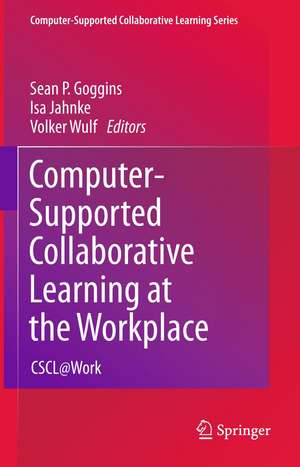Computer-Supported Collaborative Learning at the Workplace: CSCL@Work: Computer-Supported Collaborative Learning Series, cartea 14
Editat de Sean P. Goggins, Isa Jahnke, Volker Wulfen Limba Engleză Paperback – 15 iun 2015
| Toate formatele și edițiile | Preț | Express |
|---|---|---|
| Paperback (1) | 642.83 lei 6-8 săpt. | |
| Springer Us – 15 iun 2015 | 642.83 lei 6-8 săpt. | |
| Hardback (1) | 647.40 lei 6-8 săpt. | |
| Springer Us – 10 mai 2013 | 647.40 lei 6-8 săpt. |
Din seria Computer-Supported Collaborative Learning Series
- 15%
 Preț: 659.53 lei
Preț: 659.53 lei - 15%
 Preț: 648.42 lei
Preț: 648.42 lei -
 Preț: 387.38 lei
Preț: 387.38 lei - 18%
 Preț: 1832.53 lei
Preț: 1832.53 lei - 18%
 Preț: 951.29 lei
Preț: 951.29 lei - 18%
 Preț: 1135.35 lei
Preț: 1135.35 lei - 18%
 Preț: 949.55 lei
Preț: 949.55 lei - 18%
 Preț: 1021.68 lei
Preț: 1021.68 lei - 18%
 Preț: 1398.94 lei
Preț: 1398.94 lei - 18%
 Preț: 1241.25 lei
Preț: 1241.25 lei - 15%
 Preț: 639.73 lei
Preț: 639.73 lei - 15%
 Preț: 645.28 lei
Preț: 645.28 lei - 18%
 Preț: 953.20 lei
Preț: 953.20 lei - 18%
 Preț: 955.25 lei
Preț: 955.25 lei - 18%
 Preț: 1116.09 lei
Preț: 1116.09 lei - 15%
 Preț: 646.11 lei
Preț: 646.11 lei - 15%
 Preț: 641.03 lei
Preț: 641.03 lei
Preț: 642.83 lei
Preț vechi: 756.27 lei
-15% Nou
Puncte Express: 964
Preț estimativ în valută:
123.02€ • 127.96$ • 101.56£
123.02€ • 127.96$ • 101.56£
Carte tipărită la comandă
Livrare economică 14-28 aprilie
Preluare comenzi: 021 569.72.76
Specificații
ISBN-13: 9781489973887
ISBN-10: 1489973885
Pagini: 348
Ilustrații: XII, 333 p.
Dimensiuni: 155 x 235 x 18 mm
Greutate: 0.49 kg
Ediția:2013
Editura: Springer Us
Colecția Springer
Seria Computer-Supported Collaborative Learning Series
Locul publicării:New York, NY, United States
ISBN-10: 1489973885
Pagini: 348
Ilustrații: XII, 333 p.
Dimensiuni: 155 x 235 x 18 mm
Greutate: 0.49 kg
Ediția:2013
Editura: Springer Us
Colecția Springer
Seria Computer-Supported Collaborative Learning Series
Locul publicării:New York, NY, United States
Public țintă
ResearchCuprins
Introduction to discourse on transforming K-12 learning by feeding ideas from CSCL at work.- Conceptual Framework for CSCL at work.- How to apply these case studies for radical workplace learning.- Case Study: Petex.- Case Study: Facebook Corporate Policy.- Case Study: Pivotal Decisions.- Case Study: Mammography.- Case Study: WoW and Informal Learning.- Case Study: Rural Technology Workers.- Case Study: Nurturing Learning Communities.- Case Study: ePortfolio System Administrator.- New Challenges for Researchers.
Notă biografică
Dr. Sean Goggins is an Assistant Professor at the College of Information Science and Technology at Drexel University, Philadelphia, PA . His research considers how the uptake and use of information and communication technology creates new opportunities for small groups to come together and perform work, be social and dissipate physical boundaries that have historically restricted the growth of nascent organizations. In particular, Sean focuses his research on the integration of methods from phenomenological research traditions, social psychology, sociology, human information behavior and design studies to explore socio-technical phenomena within organizations and outside of canonical organizational boundaries. Dr. Isa Jahnke is an Assistant Professor at the Centre for Research on Higher Education and Faculty Development of the Dortmund University of Technology, Germany. Her academic background is in sociology, educational sciences and computer science. Isa Jahnke’s research considers on new forms of computer-mediated human structures by using new media. In particular, she focuses on the study of socio-technical informal learning by developing theories, concepts and methods. Professor Volker Wulf is on the faculty of information Systems and the director of the Media Research Institute at the University of Siegen . At Fraunhofer FIT , he heads the research group, User-centred Software-Engineering (USE ). He is also a founding member of the International Institute for Socio-Informatics (IISI ), Bonn. In 2006/07 Wulf spent a sabbatical as a Fulbright Scholar at the University of Michigan, Ann Arbor, and at Stanford University, Palo Alto. His research interests lie primarily in the area of Computer Supported Cooperative Work, Knowledge Management, Computer Supported Cooperative Learning, Entertainment Computing, Human Computer Interaction, Participatory Design, and Organizational Computing.
Textul de pe ultima copertă
This book fills the void between existing works in Computer-Supported Collaborative Work (CSCW) and Computer-Supported Collaborative Learning (CSCL). CSCL and CSCW each make important and distinct contributions to the construction of collaborative workplace learning and this book fully encapsulates the emerging application of collaborative learning theories and practices to workplace learning.
Intended for researchers and practitioners, CSCL at Work first guides the reader through the theoretical and methodologic implications of the latest data. Once a foundation is in place, numerous detailed case studies prompt readers to rethink how workplace training is presently conducted, how more collaborative learning strategies can contribute to higher performance, faster transfer of technology from research and development and other significant workplace output measures.
Contrasting with traditional workplace learning, focused on task oriented, practice oriented, or regulatory compliance objectives, CSCL at Work recognizes that creativity and innovation emerges from collaborative learning. Researchers in the fields of CSCL and CSCW need this book to expand their understanding of the intersection of these two related but discrete fields, and to provide guidance in the application of the principles of CSCL in the workplace.
Intended for researchers and practitioners, CSCL at Work first guides the reader through the theoretical and methodologic implications of the latest data. Once a foundation is in place, numerous detailed case studies prompt readers to rethink how workplace training is presently conducted, how more collaborative learning strategies can contribute to higher performance, faster transfer of technology from research and development and other significant workplace output measures.
Contrasting with traditional workplace learning, focused on task oriented, practice oriented, or regulatory compliance objectives, CSCL at Work recognizes that creativity and innovation emerges from collaborative learning. Researchers in the fields of CSCL and CSCW need this book to expand their understanding of the intersection of these two related but discrete fields, and to provide guidance in the application of the principles of CSCL in the workplace.
Caracteristici
Each chapter presents a case study for some element of CSCL at work Research questions clearly delineated and answered within the case studies Bridges the gap between CSCL and CSCW Chapters represent presentations at the CSCW conference, after undergoing substantial revision and reworking Includes supplementary material: sn.pub/extras




